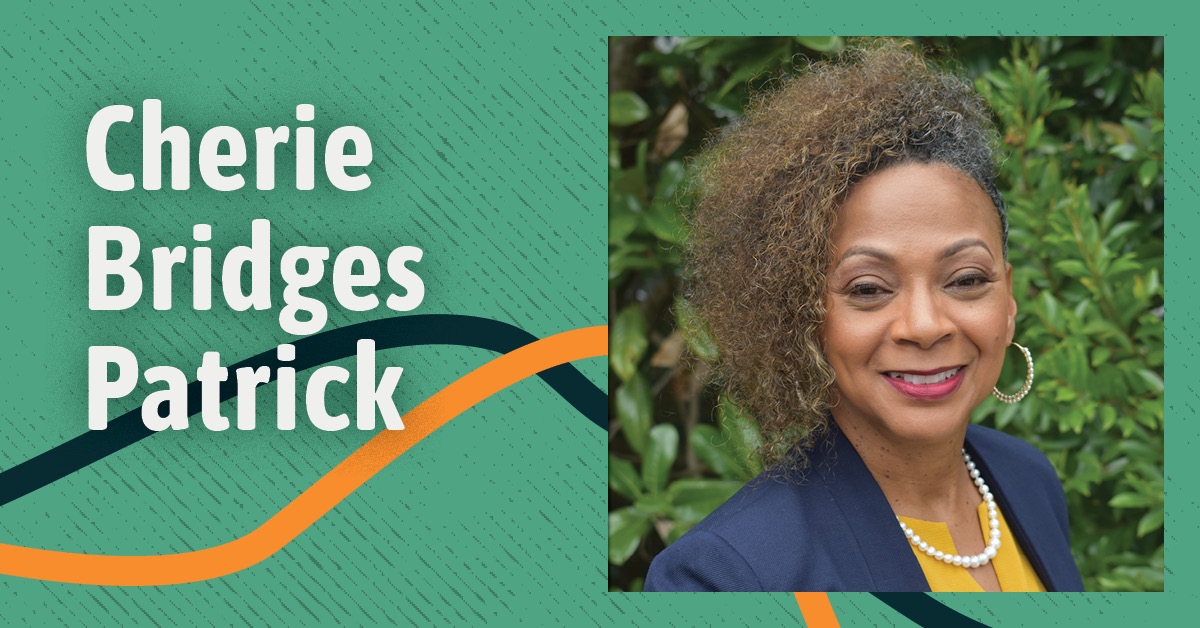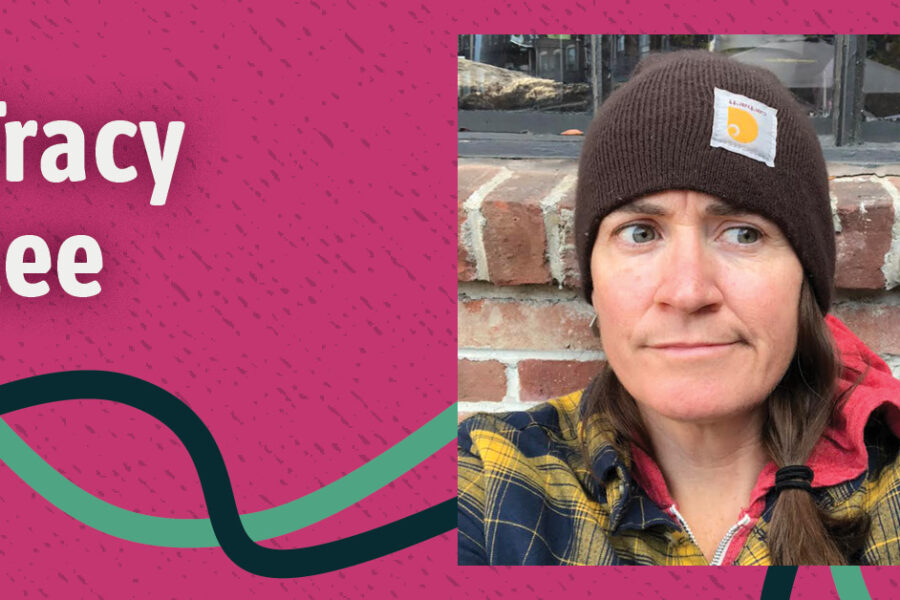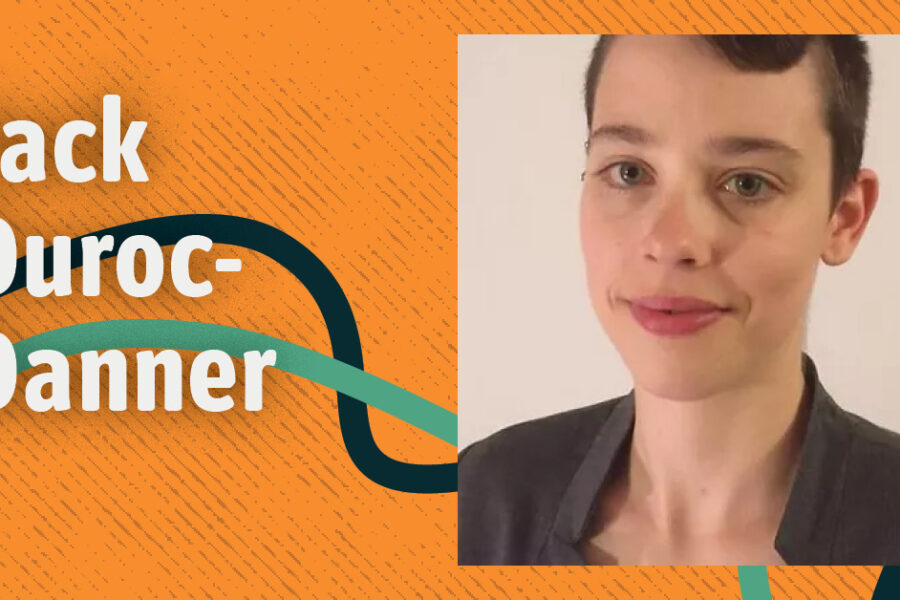As a child, Cherie Bridges Patrick was aware of racial categories in American society. She understood that she and her family were racialized as Black, and she moved through her early childhood protected by the religious practices in which she and her older brother and sister were raised. While race and racism were acknowledged, they were subordinate to the primary message of the eternal presence and abiding love of God. Often missing from the consistent narrative about God’s love, she says, “was a vigorous countering message about the cruelty of a society structured in the false hierarchy of race.” But as she grew up, Patrick couldn’t help but notice the ways racism manifested in so many aspects of life. Eventually, racial dominance became not just part of how she understood the world but also central to her work.
This is the background that led Patrick to write her PhD dissertation about the silences of racism—it is titled “Navigating the Silences: Social Worker Discourses Around Race.” The dissertation examined how discourse both illuminates and hides the ways race functions in everyday communication between social workers. Patrick believes that race is a violent social construct that sets up a human hierarchy of value based on skin color. This violence and consequent trauma is grounded in our history, operates between and through generations, is built into our structures, is sustained interpersonally, and lives in our bodies. This outlook informed all of the work she did in Antioch’s PhD in Leadership and Change program.
Throughout Patrick’s career—where she has practiced as a clinical social worker, professor, leadership coach, and consultant—she’s observed how people in justice-centered spaces often bypass the racialized practices, policies, and dynamics and end up reproducing the very injustice they often seek to change. This has led her to ask questions like, How can colleagues with different racial experiences, with different unconscious emotional and physiological reactions have generative conversations around the topic of race?
Patrick identifies problems but also believes in the necessity of honoring the dignity of all. As she says, “We don’t really have to like each other, but there’s a way that we can communicate with one another, that allows us to leave interactions with everyone’s dignity intact.” The issues Patrick describes—of race, hierarchy, and trauma—often go unseen or unacknowledged, sometimes by design. Left unchecked, they lead to their own perpetuation, to further harm. Patrick has experienced this in her own life. Her work is to give these unspoken damages a name—then the healing can begin.
Rooted in the Black Church: A Shift to Social Work
Patrick spent her childhood in a small town southwest of Cleveland, Ohio. “As my mom tells it,” she says, “I was conceived to repair their failing marriage…so at birth there was already an expectation that I would be here to help others.” She noted that it was also the formal introduction to the practice of denying her own sense of self that contributed to her traumatic voyage of life.
Patrick’s devout mother was determined to instill in her the sense that God loved everyone. In this guarded community, she felt safe and free. But at the same time, as she says, “It absolutely was sheltered, in a naïve kind of way. Not everyone held our beliefs, and you are learning to negotiate the world as a racialized Black person.”
After she graduated from high school, she went to work as a secretary. She worked for different organizations, and eventually developed years of corporate administrative experience. But ultimately she decided to return to school, get a college degree, and change careers, entering social work. After making this decision, it took Patrick twelve-and-a-half years to get her undergraduate degree. During that time she had three young children and also went through a deeply traumatic divorce. “Trauma was my life,” she says, describing that period. It was “an onerous journey of self-identity.”
Ultimately, though, these experiences fortified her interest in social work. And she came to see this field as grounded in an instinctive sense of spiritual communion that connected her back to her childhood. As she says now, “In my work, I often reference the importance of prioritizing dignity.” She believes that “the work that I do comes from my centered self and connects to my soul. With that, I honor my own innate sense of dignity, safety, and belonging which supports my ability to do that with others. For me, dignity—one’s inherent value and worth—is non-negotiable. I value myself, and with that I can value others. I belong because I am here.”
Finding a Career and a Calling
After finishing her undergraduate degree, Patrick remarried, and she quickly earned her Masters of Science in Social Work from the University of Tennessee.
At this point, Patrick began working in community mental health. She specialized in working with foster and birth families. Her experiences were wide-ranging, extending over several states and many organizations. The majority of her work was related to children, families, and trauma. She worked in Tennessee with children in foster care, their birth families, and foster parents. Then she went to Indianapolis where she worked as a mental health therapist while earning credentials to become a Licensed Independent Social Worker.
Through all of this, Patrick became increasingly aware of iniquities in the treatment of the families she worked with and in the attitudes and actions of her colleagues—and specifically she saw how these inequities were racialized. She wanted to articulate it, but, as she explains, “When I did bring it up, you could feel the shift in the room. People became silent or tried to quickly move to another topic. And that felt alienating. As my own awareness and consciousness grew,” she says, “I gave more attention to how race and racial dominance silently operated while it created so many wounds.”
Navigating Racial Dominance in the Workplace
Patrick found social work compelling. As she says, “It’s hard, hard work that I loved. I loved that world.”
But at the same time, she couldn’t ignore the accumulating problems that she saw in this line of work. It wasn’t just that people couldn’t talk about race—often it seemed that they didn’t have the resources, courage, or desire to do so. These barriers were built into the work itself. Patrick spent a lot of time on call, driving to clients—foster parents with disputes, foster children suffering from mental health crises—and she felt little support from her agency. In all of her clinical roles, there were productivity requirements. As Patrick says, “For me, there was a disconnect between caring for people and having to fulfill productivity quotas. I didn’t have time to reflect on what I was really doing.”
Over time, Patrick found that this productivity-oriented culture prevented awareness of race and deeper sources of trauma. It only looked for the most immediate problems to solve. Says Patrick, “We didn’t look at the source of the harm, we only looked at the impact…we were coming in with a lens of lack.”
As Patrick began to observe these dynamics more closely, she saw how race was often constrained to an abstract category that could be easily managed. Patrick began to notice the charge that came with the topic of race. While working in outpatient community mental health, she explains, “If race came up, it was, ‘The child is African American.’ You get the demographic listing. And it would stop. We didn’t talk about the impact that race was having on people’s lives.” Patrick couldn’t help but point this out to her colleagues and managers, but it was often met with discomfort and silence.
“That silence,” she says, “was consistent in every agency that I worked in. When I brought it up, the tension that followed was always there. The implication was, ‘Why are you bringing it up?’ It was as if race didn’t matter or have an impact on people’s lives. There was a colorblind kind of mentality.” Patrick became curious about this mentality, even as it frustrated her.
Patrick came to Antioch in 2015, and shortly after that she left agency-based social work. Eventually, she entered private practice therapy and consulting. As her work shifted, she became even more compelled to understand the dynamics around the topic of race.
Racial Discourse, Denial, Trauma, and Healing
At Antioch’s Graduate School of Leadership and Change, Patrick’s work focused on race, racism, and how social workers talk to one another. Her dissertation, Navigating the Silences: Social Worker Discourses Around Race, published 2020, investigates how social work—which is regularly presented, especially to its practitioners, as a heroic, selfless, and empathetic career—is burdened by a structured inability to acknowledge racial hierarchies. For the thesis, she finally had the opportunity to talk to people about this. She conducted interviews and a focus group that explored the ways a racially diverse group of social workers talked about race.
For the most part, says Patrick, “Data from my research paralleled my own experiences. Participants shared their experiences of how discussions of race were denied in various ways. And that was really the core of my work.” As a corollary to this core project, her research naturally led her to investigate manifestations of racial dominance. This was part of the “thematic analysis,” which looked directly at conscious behaviors and interactions. Patrick used Teun A. van Djik’s general theory of racism and denial to ground her research.
Her multidimensional dissertation, by the time it was completed, included a “thematic analysis” that illustrated various manifestations of racism and denial in social worker stories. Themes of willful avoidance, comfort/discomfort, and risk and danger emerged from the data. Narratives of willful avoidance described the ways social workers would show indifference to or intentionally look away from issues of race. Stories of comfort and discomfort detailed the ways in which the comfort of white social workers was prioritized at the expense of Black and biracial professionals. Fear was the core of the theme of risk and danger, where narratives often conflated race with violence. Patrick also employed “critical discourse analysis” to examine the ways “underlying discourse structures” maintained and/or reproduced racial dominance even as social workers attempted to carry out racially just practices.
Patrick’s research revealed vastly different professional experiences between Black, biracial, and white social workers. She also found threads of resistance in the narratives of her participants, similar to her own internal resistance to silence.
Although Patrick’s dissertation focused on professional social workers, she was also interested in illuminating the racialized stress within institutions in general, including in colleges, churches, social justice organizations. As she says, “My experiences with racial dominance within social work run parallel to my experiences and research outside of the profession. As my skills and confidence grew, I began to see stark similarities in all of the spaces I was in. Racial dominance and its consequent injury show up in leadership circles, social justice groups, religious organizations, and universities claiming to stand for racial justice.” As she says, “It’s a pattern I encounter all the time. Leaders, teams, and organizations eager to move into racial justice work have moved forward without reflecting on their own identities, racialized trauma, and their own individual and collective healing needs.”
Patrick is compelled to address her own trauma and healing needs, in which she has developed her own reserve of resources and capacity to operate in a way that “aligns with my deepest values, my best self, and my soul.” Throughout the research process, Patrick found truth and healing. She developed new resources that allowed her to heal beyond the difficulties of her experiences. Says Patrick, “The experiences that I had while doing the research really helped move me into a sense of liberation that I had not ever experienced before…because I can see how racial dominance operates. I don’t have to be held captive by this notion that I’m defective for any reason. I’m absolutely thrilled to be the person that I am.” Since publishing her dissertation, Patrick continues to advance truth and healing through writing and has co-authored published scholarship around racial justice and dominance.
Ongoing Research, Collaboration, and Healing
Patrick’s most recent co-authored journal article is titled “Whiteness in leadership theorizing: A critical analysis of race in Bass’ transformational leadership theory”. In this article, she and Antioch GSLC Professor of Leadership and Ethics Dr. Donna Ladkin problematize the normativity of whiteness in transformational leadership theory. Recently, Patrick, Ladkin, and the scholar Dr. Marion Missy McGee were interviewed for an episode of the podcast Phronesis: Practical Wisdom for Leaders.
In her work, Patrick uses her education, life experiences, and expertise to walk alongside others as they navigate trauma, trauma-related mental illness, and chronic stress. She uses neuroscience, too—polyvagal theory, which describes the ways the autonomic nervous system works—to advance healing and growth as essential elements of justice. Her private therapy practice and consulting work help individuals and organizations develop resources that allow them to hold the charge of unmetabolized trauma and chronic stress.
“The patterns of denial and avoidance that I have witnessed and found in my research are conditioned override strategies that keep us from making progress toward racial healing,” explains Patrick. “When our bodies are activated, we often feel an uncomfortable ‘charge’ or ‘sensation’ that is frequently avoided. In the context of working towards racial justice, when activated, people reflexively move towards comfort or ways to avoid the discomfort. People return to the status quo or into uninformed action that reproduces the very injustices they seek to end.”
Her work seeks to normalize what she calls “generative justice-centered dialogue.” As Patrick notes, “A prerequisite to having generative, justice-centered dialogue is first healing the trauma that lives in our bodies. It requires us to acknowledge, name, and heal the ways in which we’re all being harmed. For me, talk is useful but insufficient, and that’s where my work and research come in.”
These are the questions Patrick wants to answer: What are the ways in which we are all harmed through racial dominance and trauma? How do we begin to name the harm? Through her research and work, Patrick seeks above all to answer: how can we create sustainable practices of healing?
To learn more about whiteness in the field of leadership, listen to Antioch’s recent Seed Field Podcast interview with Dr. Donna Ladkin.



